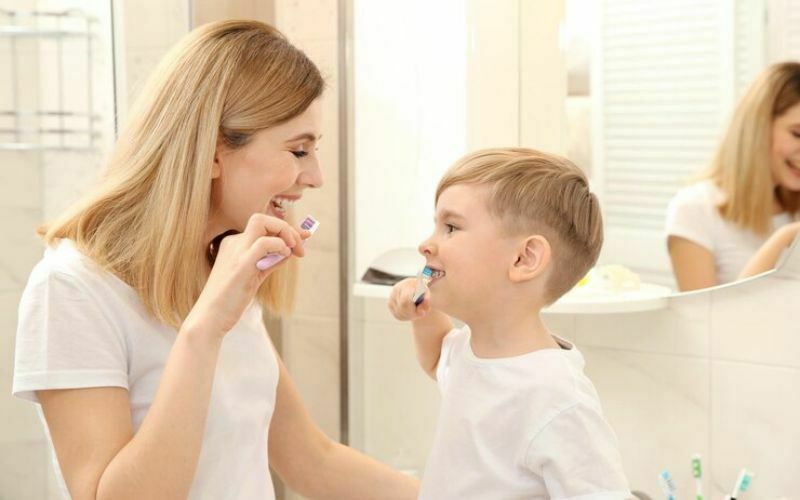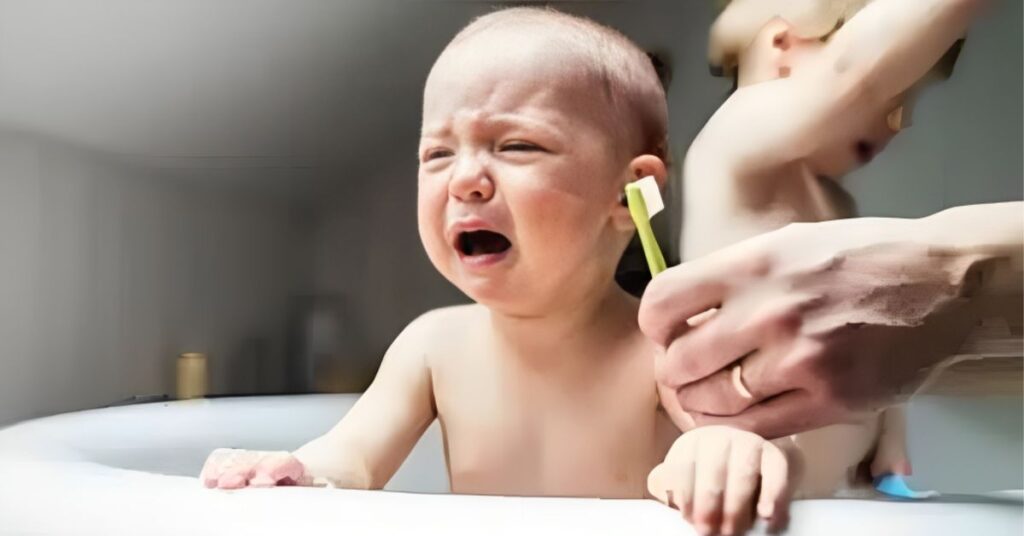Last Updated on October 19, 2023 by Muhammad Sohaib
Are you struggling with getting your baby to cooperate when it’s time to brush their teeth?
Don’t worry; you’re not alone.
Many parents face this challenge, but it’s crucial to establish good oral hygiene habits from an early age.
In this article, we’ll explore effective strategies to make tooth brushing a positive and stress-free experience for both you and your little one.
From understanding the importance of baby dental care to practical tips and tricks, you’ll find everything you need to ensure your baby’s oral health.
The Significance of Baby Dental Care
Before we delve into the how-tos, let’s understand why baby dental care is so important.
Baby dental care is crucial for their oral health. Early care establishes good hygiene habits, preventing cavities and gum problems.
Baby teeth serve as placeholders for permanent ones, impacting speech and jaw development.
Healthy primary teeth help with speech development, proper nutrition, and the alignment of permanent teeth.
When to Start Brushing
You can start brushing your baby’s teeth as soon as their first tooth erupts, typically around six months of age.
Initially, use a soft, age-appropriate toothbrush and water to gently clean their teeth and gums.
As more teeth come in, introduce a tiny amount of fluoride toothpaste, about the size of a grain of rice.
Always supervise brushing until your child can do it themselves safely, usually around age 6.
Choosing the Right Tools
- Opt for a soft-bristled toothbrush designed for your baby’s age.
- Choose fluoride-free, baby-friendly toothpaste.
- These selections are crucial to protect your child’s delicate gums and emerging teeth.
- They ensure safe and effective oral care from the start, establishing healthy dental hygiene habits early on.
Creating a Positive Environment
Make toothbrushing an enjoyable ritual.
Play their favorite music, sing songs, or brush your teeth together to demonstrate that it’s a normal part of the day.
The Two-Brush Technique

The Two-Brush Technique for babies involves using two different brushes for cleaning their teeth and gums.
Start with a soft-bristled baby toothbrush to gently clean their teeth. Then, use a soft, damp cloth or gauze pad to wipe their gums and tongue.
This method ensures comprehensive oral care from an early age, promoting good dental hygiene habits.
Overcoming Resistance
Be Patient and Gentle
Understanding that resistance is common is the first step. Be patient, and always use gentle, circular motions when brushing their teeth.
Choose the Right Time
Timing matters. Try to brush your baby’s teeth when they are alert but not too cranky. Avoid brushing right after a meal, as this can be uncomfortable for them.
Distraction Techniques
Engage your baby with a toy, sing a song, or tell a story to divert their attention from the brushing process.
Consistency is Key
Make tooth brushing a consistent part of their daily routine. The more they get used to it, the less resistance you’ll face.
How To Brush Baby’s Teeth When They Refuse
One effective technique to ensure a thorough cleaning when your baby resists brushing is to swaddle them gently.
Wrap them in a blanket, exposing only their mouth and nose.
This can keep their arms and legs from flailing, making it easier to brush their teeth.
FAQ’s
How often should I brush my baby’s teeth?
Brush your baby’s teeth at least twice a day, in the morning and before bedtime.
When can I switch to a fluoride toothpaste?
You can start using a fluoride toothpaste when your child is around 2 years old, but consult with your dentist to determine the right time.
What if my baby swallows toothpaste?
Don’t worry; swallowing a small amount of fluoride-free toothpaste is not harmful. However, teach them to spit it out as they grow older.
Is it essential to use a baby toothbrush?
Yes, using a baby toothbrush with soft bristles and an age-appropriate size is essential to prevent any harm.
How do I choose the right toothpaste for my baby?
Choose a fluoride-free toothpaste designed for babies and toddlers. Look for brands recommended by pediatric dentists.
What if my baby resists brushing despite all efforts?
If your baby consistently refuses to brush their teeth, consult a pediatric dentist for professional guidance.
Last Words
Brushing your baby’s teeth when they refuse can be a challenging task, but with patience, creativity, and a little bit of fun, you can make it a positive experience.
Remember, developing good oral hygiene habits from an early age is essential for their overall health and well-being.
Ensure your baby’s bright smile and healthy teeth by following these expert tips. You’ve got this!






